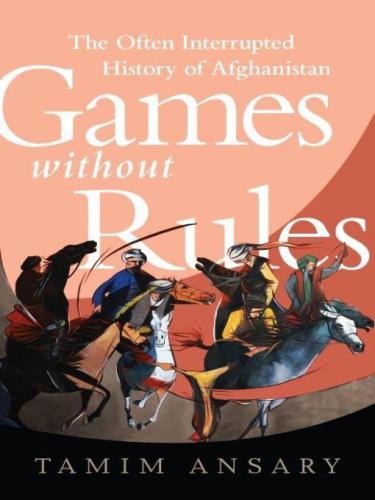
Games without Rules
The Often-Interrupted History of Afghanistan
کتاب های مرتبط
- اطلاعات
- نقد و بررسی
- دیدگاه کاربران
نقد و بررسی

Starred review from December 17, 2012
Long one of the most disputed territories in the world, Afghanistan holds a strategic geographical position that has placed it in the way of empires for centuries. However, over the past two centuries each time a major world power has attempted to intercede in Afghan affairs they have failed. Ansary (Destiny Disrupted), an Afghan-born US citizen and director of the San Francisco Writers Workshop, offers an illuminating history of the country, providing not only a chronology but a deep cultural analysis that allows outsiders a comprehensive picture of Afghan mores and practices. This insider's perspective fills large gaps in contemporary outsiders' understandings of why these powers have failed and hopefully points the way towards forms of international cooperation that will work for Afghanistan rather than against it. Ansary has a gift for using informal language to illustrate his points in a way that doesn't compromise the legitimacy of his narrative. His ability to contextualize the history and situate it in culture, as well as to remind readers of when to keep track of important figures (sometimes for decades) is refreshing. Ansary has produced an invaluable resource to those curious about this tumultuous region. Agent: Carol Mann, Carol Mann Agency.

October 15, 2012
A breezy, accessible overview of centuries of messy Afghan history, including the present military quagmire. Ansary has previously written history from "Islamic eyes" (Destiny Destroyed, 2009, etc.); here, he casts the perplexing trajectory of Afghanistan as a kind of chaotic but nonetheless functioning scrimmage interrupted periodically by foreign invaders bent on their own "great game." First united under the neo-Persian young leader Ahmad Shah, the various Pushtoon tribes first grew into a national awareness of "Afghanistan" by the mid 18th century. All the while, they remained wary of the Europeans, specifically the British and the Russians. Repeated invasions helped coalesce the Afghan state, firm up its borders and establish the capital at Kabul, as well as helping "unleash the unruly energy of Afghan tribal society." As a native of Kabul, Ansary lends precious insight into the makeup of the typical Afghan village, with its tidy, self-sufficient, patriarchal hierarchy and need to keep the nomads at bay. The loss of Peshawar, institutionalized in the arbitrary Durand line drawn up by the eponymous British diplomat in 1893, continued to be a thorn in the Afghanis' side until the present. The modernizing period ushered in by Amir Amanullah in the 1920s sidestepped Shariah and fostered a brief period of reform, followed by 40 years of royal family-run government that was fairly indulgent, even modern and enterprising, thanks to Western cash for development projects such as the Helmand Valley Authority. The Cold War again placed the country in a tug of war, this time between the Soviets and Americans, resulting in one morass after the other--and it's still ongoing, exacerbated by the Taliban, al-Qaida, refugees, drugs, corruption and discoveries of mineral wealth. Lively instruction on how Afghanistan has coped, and continues to cope, with being a strategic flash point.
COPYRIGHT(2012) Kirkus Reviews, ALL RIGHTS RESERVED.

November 15, 2012
Afghan American writer Ansary (West of Kabul, East of New York, 2002) tells the history of modern Afghanistan with a master storyteller's confidence and a disarmingly casual tone. Wow! he remarks, reacting to Afghan president Sardar Daoud's willingness to implement a new constitution that would limit his own power. When has something like this ever happened? But don't be fooled: this is a nuanced, sophisticated historical narrative that strives to tell Afghan history from an Afghan perspective, as the story of a zigzag journey toward some end point despite regular interruptions by foreign interventions, including the strategic military adventures of Great Britain, the Soviet Union, and the U.S. It's an open question, of course, what that end point may be; Afghanistan is still a country in conflict, and the present is a moving target. Yet, as Ansary points out, There was always a here here, and though the great powers have changed through history, The land-in-between never disappeared. Throughout this selection, the author's love for his native land and his optimism for its future shine through.(Reprinted with permission of Booklist, copyright 2012, American Library Association.)

























دیدگاه کاربران